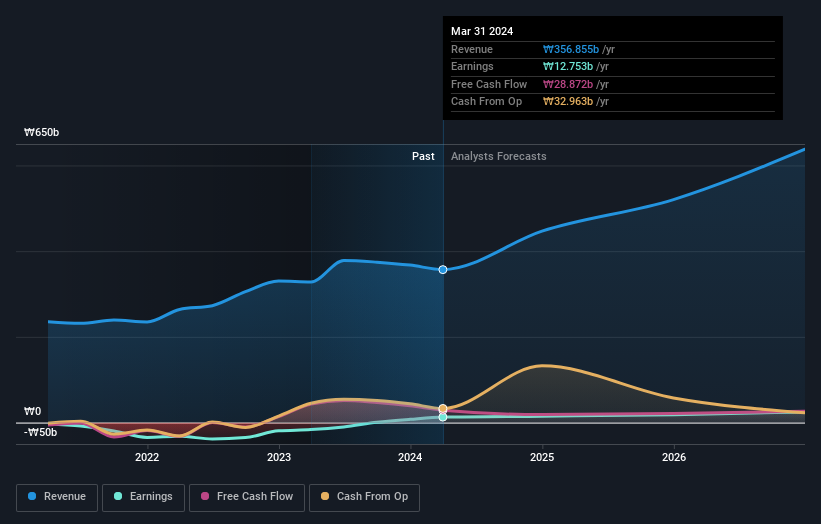- South Korea
- /
- Machinery
- /
- KOSDAQ:A083650
BHI Co., Ltd.'s (KOSDAQ:083650) market cap up ₩44b last week, benefiting both individual investors who own 54% as well as insiders

Key Insights
- BHI's significant individual investors ownership suggests that the key decisions are influenced by shareholders from the larger public
- The top 11 shareholders own 46% of the company
- Insider ownership in BHI is 40%
To get a sense of who is truly in control of BHI Co., Ltd. (KOSDAQ:083650), it is important to understand the ownership structure of the business. And the group that holds the biggest piece of the pie are individual investors with 54% ownership. In other words, the group stands to gain the most (or lose the most) from their investment into the company.
While individual investors were the group that reaped the most benefits after last week’s 15% price gain, insiders also received a 40% cut.
Let's delve deeper into each type of owner of BHI, beginning with the chart below.
See our latest analysis for BHI

What Does The Institutional Ownership Tell Us About BHI?
Institutional investors commonly compare their own returns to the returns of a commonly followed index. So they generally do consider buying larger companies that are included in the relevant benchmark index.
We can see that BHI does have institutional investors; and they hold a good portion of the company's stock. This can indicate that the company has a certain degree of credibility in the investment community. However, it is best to be wary of relying on the supposed validation that comes with institutional investors. They too, get it wrong sometimes. If multiple institutions change their view on a stock at the same time, you could see the share price drop fast. It's therefore worth looking at BHI's earnings history below. Of course, the future is what really matters.

BHI is not owned by hedge funds. The company's CEO Jong-Inn Woo is the largest shareholder with 17% of shares outstanding. For context, the second largest shareholder holds about 17% of the shares outstanding, followed by an ownership of 4.7% by the third-largest shareholder.
On studying our ownership data, we found that 11 of the top shareholders collectively own less than 50% of the share register, implying that no single individual has a majority interest.
While it makes sense to study institutional ownership data for a company, it also makes sense to study analyst sentiments to know which way the wind is blowing. There is a little analyst coverage of the stock, but not much. So there is room for it to gain more coverage.
Insider Ownership Of BHI
The definition of an insider can differ slightly between different countries, but members of the board of directors always count. Company management run the business, but the CEO will answer to the board, even if he or she is a member of it.
Insider ownership is positive when it signals leadership are thinking like the true owners of the company. However, high insider ownership can also give immense power to a small group within the company. This can be negative in some circumstances.
Our information suggests that insiders maintain a significant holding in BHI Co., Ltd.. It has a market capitalization of just ₩328b, and insiders have ₩132b worth of shares in their own names. This may suggest that the founders still own a lot of shares. You can click here to see if they have been buying or selling.
General Public Ownership
The general public -- including retail investors -- own 54% of BHI. This size of ownership gives investors from the general public some collective power. They can and probably do influence decisions on executive compensation, dividend policies and proposed business acquisitions.
Next Steps:
I find it very interesting to look at who exactly owns a company. But to truly gain insight, we need to consider other information, too. Be aware that BHI is showing 4 warning signs in our investment analysis , and 1 of those shouldn't be ignored...
But ultimately it is the future, not the past, that will determine how well the owners of this business will do. Therefore we think it advisable to take a look at this free report showing whether analysts are predicting a brighter future.
NB: Figures in this article are calculated using data from the last twelve months, which refer to the 12-month period ending on the last date of the month the financial statement is dated. This may not be consistent with full year annual report figures.
Valuation is complex, but we're here to simplify it.
Discover if BHI might be undervalued or overvalued with our detailed analysis, featuring fair value estimates, potential risks, dividends, insider trades, and its financial condition.
Access Free AnalysisHave feedback on this article? Concerned about the content? Get in touch with us directly. Alternatively, email editorial-team (at) simplywallst.com.
This article by Simply Wall St is general in nature. We provide commentary based on historical data and analyst forecasts only using an unbiased methodology and our articles are not intended to be financial advice. It does not constitute a recommendation to buy or sell any stock, and does not take account of your objectives, or your financial situation. We aim to bring you long-term focused analysis driven by fundamental data. Note that our analysis may not factor in the latest price-sensitive company announcements or qualitative material. Simply Wall St has no position in any stocks mentioned.
About KOSDAQ:A083650
BHI
Engages in the development, manufacture, and supply of power plant equipment worldwide.
Moderate growth potential with acceptable track record.


